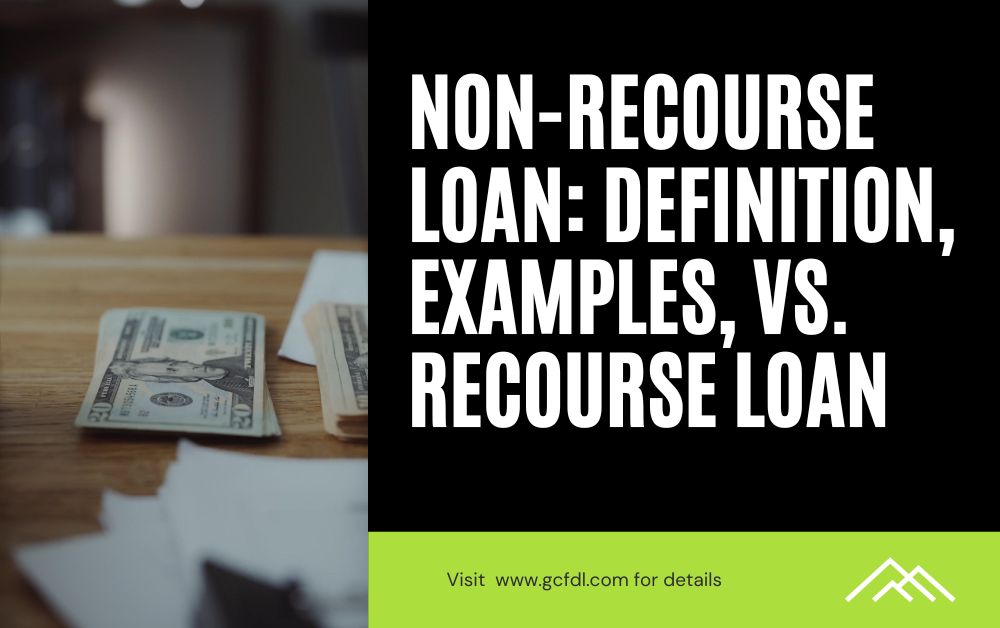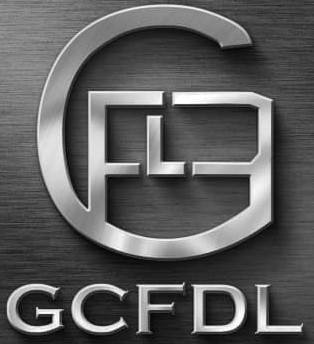Email Us Now: info@gcfdl.com
Non-Recourse Loans Vs. Recourse Loan
Non-Recourse Loans: Definition, Example, Vs. Recourse Loan.
A non-recourse loan is a type of loan secured by collateral such as property or shares, where if the borrower fails to repay the loan, the lender can only seize the specified collateral and cannot pursue the borrower’s other assets or income. This makes non-recourse loans attractive to borrowers who want to limit their personal financial risk. In simple terms, A non-recourse debt does not hold the borrower personally liable for the loan.
This type of loan is prevalent in real estate and project finance, where specific assets generate revenue that serves as security for the loan.

Key Features of Non-Recourse Loans
Asset / Collateral Based Security: Non-recourse loans are secured by a specific asset or a group of assets such as real estate, equipment, or other valuable property. This means that if the borrower defaults, the lender has the right to take possession of the collateral but has no further claim against the borrower’s other assets or income.
Limited Liability: Borrowers are not personally liable beyond the value of the collateral. This can be beneficial for businesses and individuals who want to limit their risk.
Higher Interest Rates: Given the increased risk to lenders, non-recourse loans often come with higher interest rates compared to recourse loans.
Use in Real Estate: In the real estate market, non-recourse loans are frequently used to finance commercial properties. The property itself serves as collateral, and the lender cannot pursue the borrower’s other assets if the property’s value falls short of covering the debt.
Project Financing: Non-recourse loans are also common in project finance, where the cash flows generated by the project are used to repay the loan. This limits the borrower’s exposure to risk if the project does not perform as expected.
Advantages and Disadvantages of Non-Recourse Loans
Non-recourse loans can be a great option if you want to take advantage of an investment opportunity but don’t have the funds to finance it. A non-recourse loan can provide the additional funds you need without putting additional collateral at risk. Asset protection is the most significant benefit of a non-recourse loan, as the loan shields unrelated assets if you default. This is especially important for investors who use non-recourse loans to purchase real estate.
Advantages of Non-Recourse Loans
- Risk Management: Borrowers can protect their personal assets, making non-recourse loans appealing for high-risk investments.
- Encourages Investment: Investors might be more willing to engage in projects with higher risks since their personal liability is limited.
- Simplified Default Process: In case of default, the process is straightforward as it involves only the collateral without affecting the borrower’s other financial resources.
Disadvantages of Non-Recourse Loans
- Limited Availability: Not all lenders offer non-recourse loans, which can limit options for borrowers.
- Potential for Higher Costs: While these loans reduce personal risk, the higher interest rates and fees can make them more expensive over time.
- Strict Lending Criteria: Lenders often impose stringent qualifications, including higher credit scores and detailed financial disclosures, to approve a non-recourse loan.
Recourse Loan Vs. Non-Recourse Loan
When shopping for a real estate loan, you’ll come across two general categories: non-recourse and recourse loans. Factors such as your comfort level with the lender, the affordable amount, and interest rates are important. However, one of the most crucial decisions is whether to choose a non-recourse or recourse loan. Each option has its own advantages and disadvantages.
Recourse loans allow lenders to go after additional assets, deposit accounts, and sources of income if the borrower defaults, unlike non-recourse loans. This means that while recourse loans are less risky for lenders, they are riskier for borrowers because they have greater liability.
Both secured and unsecured personal loans can be recourse debts, meaning the borrower is personally liable and assumes all the risk. If the collateral is sold and there is still money owed, it is called a deficiency balance. The lender can try to collect this balance in various ways, such as by filing a lawsuit and getting a deficiency judgment in court.
Non-Recourse Loan Examples
Real Estate: An investor takes a non-recourse loan to purchase a commercial property. If they default, the lender can seize the property but cannot go after the investor’s personal assets.
Project Finance: A renewable energy company secures a non-recourse loan to build a solar farm. The loan is repaid from the revenue generated by selling electricity. If the project underperforms, the lender can claim the solar farm but not the company’s other assets.
Do banks and financial institutions offer non-recourse loans?
Most banks and financial institutions prefer giving out recourse loans to avoid the risk of loss in the event of defaults. Yet, many banks will provide non-recourse loans for the right borrower, especially if you have stellar credit scores, although at higher interest rates. Some might offer nonrecourse loans to preferred borrowers, but terms and rates can be much higher than they would be for recourse loans. General Credit Finance and Development Limited provides recourse and nonrecourse loans at an annual 4% interest rate.
In summary, non-recourse loans offer a way to finance projects and purchases with limited risk to the borrower. They provide an opportunity to leverage assets for capital while protecting personal and additional business assets from lender claims. However, the trade-offs include higher interest rates and more stringent lending criteria.
General Credit Finance and Development Limited (GCFDL) is a prominent loan company based in Hong Kong. Since our establishment in 1973, we have been a trusted choice for businesses worldwide, providing customized financial solutions for businesses and welcoming applicants from all cultures and nationalities without discrimination.
Our Core Services include:
– Business Loans: Tailored loan solutions to meet your company’s specific needs.
– Standby Letters of Credit (SBLC): Secure international trade with our SBLC services, backed by top AAA-rated banks.
– Bank Guarantees (BG): Strengthen your financial standing with our BG solutions.
– Leased Bank Guarantee: Gain immediate access to financial instruments through leasing.
– SBLC/BG Monetization: Unlock liquidity from your bank financial instruments to fuel growth.
Why Choose General Credit Finance?
Whether you need a recourse or non-recourse loan, international project financing, trade finance, to activate credit lines, monetize financial instruments, or secure a bank guarantee/letters of credit for international trade, we have the expertise and global connections to make it happen.
We provide loans for all industries and sectors at a competitive interest rate of 3% per annum and welcome applicants from all races, cultures, and nationalities without discrimination. If your business or project is profitable and sustainable, we will provide the funds you need to take your business to the next level.
All our bank instruments (BG, LC, SBLC, etc.) are issued from top-rated banks such as Citibank New York, Chase Bank, Wells Fargo, Bank of America, HSBC, Barclays Bank London, Standard Chartered Bank, UBS Switzerland, Deutsche Bank AG Germany, etc. Our annual leasing fee for Bank Guarantees (BG) and Standby Letters of Credit (SBLC) is 4%.
Join Our Brokers Program – Earn 2% Commission on Every Deal!
We’re excited to invite new brokers to our lucrative Brokers Program. Our brokers earn 2% commission for every successful deal you bring to us.
Get Started Today!
Learn how our loan, SBLC, or Bank Guarantees can transform your business. Whether you’re an entrepreneur seeking financing or a broker eager to join a winning team, General Credit Finance and Development (GCFDL) is here to help you every step of the way


[…] Non-recourse loans use only the asset involved as collateral. For example, mortgages are traditionally non-recourse loans, using only the home itself as collateral. This means that the lender can only seize the home if the borrower fails to repay the loan, and cannot go after personal bank accounts or any other assets the borrower owns to recover the loan amount. […]
[…] Standby Letter of Credit Monetization arrangement issues Non Recourse funds to the Client shortly after the Standby Letter of Credit (SBLC) is delivered to the […]
[…] to our clients including Collateral Transfer, personal loans, business loans, Recourse Loans, Non-recourse Loans, bank instruments, Lease SBLC, Monetize SBLC, Lease bank Guarantees & the Monetization of bank […]
[…] Standby Letter of Credit (SBLC) monetization is the process of converting a Standby Letter of Credit (SBLC) into cash or legal tender. SBLC monetization process can either be a recourse or a non-recourse loan. […]